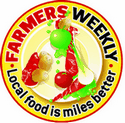
Pembrokeshire Bunkhouse
Upper Neeston
Farm


The farmhouse and forge were built around 1800 with the addition of the barns around 1850 made the place quite a large homestead. Much of the farm was built from timbers from a shipwreck called the Felicite which went aground on Sandy Haven in 1833. However there has been a settlement called Nee Stone on the site for hundreds of years.
The Farm is mortgaged through the Ecology building society that requires its members to adhere to strict policies on energy conservation and sensitive conversion techniques. As part of this the whole Farm uses technology which is mindful of the environment. The Ecology was the only lender prepared to support the renovation of this ruined farmstead.
The National Park Ecologist, Dyfed Archaeology and the local bat group were all involved in the planning and construction phase. Bat roosts were built into the design of the roofing and nesting boxes are sited around the buildings.
The farm was bombed during the war and bomb disposal had to attend an unexploded incendiary device uncovered during excavations to lay a new powerline and water to the property. The old garden wall had shown signs of collapse but we thought it was just the ravaging of time, however when we excavated next to it we uncovered a German incendiary bomb! This was probably dropped with the intention of hitting the fuel storage site in Milford Haven. Bomb disposal came out and X rayed it and decided its fuse was incomplete inside, they said a number were dropped like this as an unexploded bomb tied up more resources than one that had gone off.
The Farm's produce has been awarded the Pembrokeshire Produce mark for food produced and processed locally. The Farm has also been a member of numerous Agric Environment schemes which encourage a more nature aware style of Farming. We farm on low inputs of fertiliser and limit our use of chemicals by rotating grazing regimes.





Commercial Sheep Breeds
We originally started out flock in 2003 with 80 older cross bread ewes, we purchased good quality pure Suffolk rams to improve our stock replacements which then became our new Neeston Flock Base. After several years of using Suffolk Rams we decided we needed to improve the hardiness of our flock and also introduce a faster finishing gene into our breeding ewes. We switched our Breeding Rams to Pure texels and crossed them onto our ewes, the following year our lambs finished faster and were noticeably more Hardy.
Over time we have lowered our commercial stock numbers and replaced them with more coloured Ryelands.
Coloured Ryeland Flock
In 2014 we branched out in pedigree coloured Ryeland sheep which we show successfully both locally and nationally. The Ryelands are friendly sheep that you will see around the farm. They are often referred to as teddy bear sheep as the lambs are so woolly.
Ryeland sheep are a traditional British sheep breed. They are well known for producing excellent quality lamb and great tasting meat. Ryeland lamb is much sought after by rare-breed butchers, top chefs, hotels and restaurants. Hand spinners and weavers also seek out Ryeland wool for it texture and quality. Unlike some breeds of sheep Ryelands are docile and easy to look after, which makes them ideal for smallholders or people new to keeping sheep. Ryeland and Coloured Ryelands do well on a diet of good grass, without the need for additional feed. This means they are particularly suitable for organic lamb production.